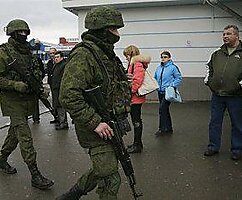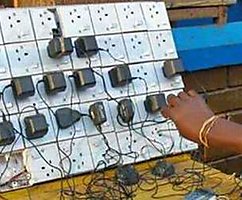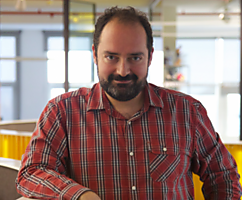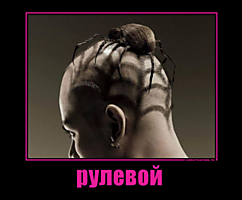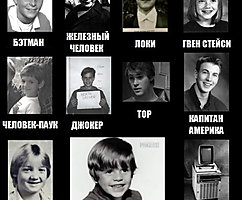The Alfred Laengle: When there is no dialogue, we are lost
 Bashny.Net
Bashny.Net
The Alfred Laengle – name known among Russian psychologists and psychotherapists. It is often mentioned in pair with another, not less known by Frankl Viktor. Being an ideological follower, Laengle continues the debate with the schools of depth psychology and psychoanalysis, and develops his form of psychotherapy – existential analysis.
The new approach proposes to change the vector of work in psychotherapy. Instead of looking for the roots of their actions in deep conflict, the instinctual drives and archetypal influences, man should realize himself the subject of his most serious experiences, instinctual drives, and other manifestations of mental process.
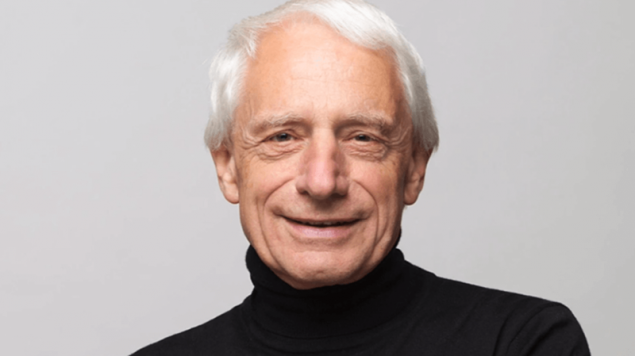
In other words, we are invited to concentrate on that modest piece of free will which makes us human (assuming, of course, the raging ocean of unconscious motives and the various constraints dictated by biology, evolution and society).
Existential analysis tries to draw man's attention to base -, ground zero of all human experiences – the subjective experience of themselves as thinking, feeling and acting beings. Showing awareness in how he lives his life, the man, according to Laengle, can overcome the alienation and despair that are so abundantly found in contemporary culture.
With a mission to popularize the existential analysis as a therapeutic method Laengle often visits Russia and conducts a master's programme at the faculty of psychology of the HSE.
I was going to regular lectures of the Professor, and the sudden assignment encouraged me to distribute a list of topics that seemed relevant at that moment. Get a short cut story about how to be on good terms with himself when in the country of your residence "history".
– I attended your wonderful lecture, and I must say that I am very glad that our publication share humanistic values. First of all talking about needs to be a person, what you so thoroughly told. This is one of the key concepts of your therapeutic approach, which became a term and resembles the blueprint of the German – Person. Could you tell me why it's so important to be a person?
– In a nutshell, it is important to be a personality because personality is what makes a person human. His or her being a person is one of the unshakable properties of human life, a depth, a personality and intimacy of each person, which reflect who he really is. Each of us wants to be seen and understood just as a person. In this context, means the understanding of the personality includes things that are important to me, my values and my position. Therefore, the ability to be a person gives me an integral, final freedom and the deepest understanding of himself.
To be a person – not a cognitive process. This awareness of the possibilities that we have laid down and which we have. As a person I can see deeper, I can highlight the important, and to distinguish right from wrong. As a person I can carry on an internal dialogue. As a person I can meet other people and talk – not in the superficial sense, but really deep when I touched another person, and to see what's really important.
– We know that your work on existential analysis very warmly accepted in the Russian therapeutic community and that you have many followers in our country. Why do you think this is possible? That offers a person your understanding of psychological well-being?
– Trips and meetings, I notice how the Russian people are eager and willing to find authentic, valuable and profound in life. And I was under the impression that the Russian people really love and appreciate the depth and intimacy and looking for them in yourself and others. However, if you look at it from a historical perspective, we will see that in the days of communism the spiritual dimension of the person just ignored, they were ignored.
Need to be a person and the need for personal freedom was impaired. Those things that make us human, was not a subject of public interest. What matters for communism, a social system, and the individual with its values was subordinated to the values of the social system. Therefore, people feel cultural shortage, about which we are talking in the existential analysis.
What it means to be a person? How to find a life of meaning? How to go beyond the simplified life functions and how to find a way to live a full life? These are questions that have no easy answer.
I must say that boom neocapitalism that replaced communism, was not much better. The thirst for material values that emerged in the process of this transition, has again overshadowed the value of being a person and opportunities for the development of internal dialogue. Society turned away again, and stepped over what makes us human.
When intrinsic values are not recognised and not accepted when people are unable to perceive their inner world, they become easy targets for different kinds of external influencers: political leaders, ideologies or superstitions like healing and psychics. People easily fall into error and can be captured by alien ideas imposed by the government, nationalism, capital, and other ideologies. Because when we are not rooted in ourselves, we inevitably seek guidance from the outside.
– Find contact with yourself and try to hold this relationship is definitely a great experience, and in his public speeches, you often give to others to try what it's like. Last your lecture I did it. However, as I have noticed, after the lecture, I felt tired, somehow related to what I just experienced. So the question stems from my direct experience: why to find contact with yourself is so important and so exhausting at the same time?
– A lecture you were inspired, and after she felt tired. Fatigue usually indicates done the emotional work. Perhaps the lecture you for the first time drew attention to their existence, felt – realized themselves alone.
Considering these feelings, you may find that you are with them not in good terms, that maybe hard for you to talk to me. You were inspired by the idea of meeting with him, but in the course of this meeting you see that it can indeed be difficult. And at the moment you should take that contact of this kind, whatever it was inspirational, and requires your personal effort.
– I understand that part of your theory, which describes the Genesis of personality and Person, you're talking about some new form of perception, which refers to the existential dimension. If so, what he perceives?
– A good metaphor. This body sees the existential dimension. What does this mean for us? When I look at the world impartially, discarding your previous experience, I feel the resonance within yourself, and it allows me to understand what is important and what is unimportant. We refer to this phenomenological perception. This intuitive perception is more of a feeling or a sensation, a feeling that is truly important.
– In the existential analysis we are faced with a term such as topingovy reaction. These are ways to cope with different levels of discomfort or suffering in life. It should be noted that the reaction is not a tool that we deliberately use this ways of overcoming difficulties that we unconsciously resort to when not consciously ready to meet source of concern.
There is the idea that people, being social creatures, are strongly associated with each other, and we to some extent share the same neuroses that are common to certain communities. How to calculate, can this be true? And can we in this case to talk about topingovy reactions across the city, country or nation?
We can talk about topingovy reactions in larger communities, such as family, school or even larger. The whole state can be more or less susceptible to topingovy reaction from a certain kinds of acute social processes or the availability of common fears among people. A sad but recent example from today: I often hear that many Russian families split in two and can't talk to each other because some agree with the annexation of Crimea, while others believe that it was unacceptable.
It is obvious that the reaction of both is greatly exaggerated, and it refers to symptoms that are easily observed in borderline patients. In the end, people feel divided, can't talk, fall into the aggressive affects and do the depreciation. Dialogue based on facts is very difficult or even impossible. Something similar happens to you, at least in Moscow.
– Yes, it is increasingly evident that we can hardly talk to each other on different sides of the barricades. But if you can consider topingovy reaction in a broader sense, what could be the therapeutic approach at this scale?
– It is also a good analogy, and we can build a parallel between what we do in therapy, and what can be done in a public format. Because the Parallels are indeed there. In therapy, when we encounter boundary reactions, we must see what danger, what values we need to protect right now –and start talking about it.
When we work with a group, we need time to figure out what is important to you now, why do you think that's important? The ability to say: please listen to what is important to me. Then we put on the map our values and can thus see where they intersect. And differences that we find – they should stay. And most importantly: there is no place for haste and urgency. We will need a lot of time and calm to talk about it.
For example, you can take the war in Ukraine – what is it? Why is this happening? Now we are overloaded with information, but it can hardly be called a full-fledged and flawless. We are very vulnerable in terms of facts. For the most part we only know that fighting is going on. But if both parties agree, I can't be sure of the information that is already a good start.
There are facts that are already undisputed, for example, that the Crimea belongs to Russia and it is the result of the invasion. These facts are the minimum with which we can agree. The rest is very confusing because of the intervention of propaganda and the total information uncertainty. But we must accept that we are vulnerable to unverified information and to be aware of the vulnerability itself, and other. We should together, with proper attention, to reflect on our understanding of the situation.
That was clearly a mistake? That was OK? What helped? That was incompetence? Just discuss what is happening and why it hurts us so much. How is it connected with us and with me? Do I want this war? What can I do to reduce the damage from this war? What can I do for my family, to restore the dialogue? How to help the Ukrainians and Russians in Ukraine? The best way is, of course, to come to a common agreement through negotiations, not to impose a solution. The war in the Ukraine – now the war is in Russian families, and it's awful.
– In our publication we would like to support the need for dialogue without censorship and to enable the humanistic values have their place.
– What you are doing is very good. You aim at an open dialogue, and you make conscious the fact that we have problems. No need to try to convince the other that we should try to understand the other.
– How you think, whether the information uncertainty to be the result of what you were saying before: people do not have enough rootedness in ourselves?
– Yes, and that makes dialogue very difficult. When there is no dialogue, we are lost, we are divided between us the war. The only real thing that can prevent war, it is dialogue. When it stops, we are divided and fighting against each other. Everyone wants to be right, wants to be dominant and wants to avoid the attacks of the opposite side.
About the treatment and perception of disease
It is very important to have a good relationship with them and to establish contact with his personal beginning (Person). But we often lose these values when we need help. What bothers me is the fact that in Russia we are missing something very important when it comes to getting psychological help. Society is fenced off from mental health issues, and perceptions of illness or injury full of archaic prejudices and stigma. Can you give recommendations on how to overcome this painful gap in understanding and to come to respect psychological problems?
Is the suppression is the impairment of mentally ill people, it is a diversion against them, and this should be discouraged as much as possible. There is no doubt that globally there is acceptance of such people. If a person has cancer, he needs an operation or radiotherapy.
If a person is allergic, he needs medication. Need for treatment – not a personal fault of the person. The same applies to schizophrenia, and anxiety disorders, sleep disorders, addictions of all kinds. In Russia, a lot of drug addicts, and it is a disease – not a lack of character. She requires treatment. All physicians, psychologists know this. But public opinion may be different.
Depreciation and prejudice towards the sick, which we observe, must be eliminated through public hearings, TV shows, education in the workplace. People experiencing psychological problems or are prone to burnout on the job have a special relationship based on understanding and respect. It should be clearly distinguishable, then we can restore human relationships and make our society more humane.
– Wanted to ask you about one particular Russian sphere of psychological health. On average, the market psychologist-the therapist loses much in comparison with a psychiatrist, which is often more popular. Is this also a result of distrust and the desire to find external benchmarks?
– It is unclear to me why this is happening in Russia. It may be a combination of several causes, it usually is. First of all the matter in the devaluation and rejection of mentally ill people. For example, you go to the therapist, and then think you are a weak person and don't respect anymore.
But if you go to a psychiatrist, then of course you got sick, and it's a good enough reason to go to the doctor. Maybe the reason is not good enough the training of some therapists who really did their job well. In this case, we have public reaction to the unsatisfactory results of psychotherapy. We have to be self-critical.
And of course, it is always easier to go the path of least resistance and solve the problem with medication. Some diseases require medical treatment, others can be alleviated with the help of pills, but in reality it's not a cure, just masking the symptoms. The third group does not require drug treatment, the symptoms eliminated speech therapy: there are just problems that need to be addressed. So this story can have different roots.
Dmitry Likhachev: what is the meaning of life
Vadim Zeland: Not "my tongue — my enemy", and the thoughts are my enemies
About the Internet
Now I would like to put your concept of personality in the context of modern life, so that our readers could look at it from different sides. I will ask you about the Internet. Do you know about the very common problem of our time, aimless time on social media? How do you think the phenomenon of Facebook or other social networks become an obstacle to a person on the way to a good contact with yourself? What advice would you give people on the Internet?
– The advice is simple. When you sit in the Internet, Facebook or just trying to cope with this enormous universe of information; when you are going to start to read or write something, give yourself a minute to think. Sit back, close your eyes and ask yourself: does it really matter what I'm doing right now? Do I feel that this is important? If I want to live for today, must do it today to take my life? Or, maybe in my life there are more important things? Then open your eyes, sit down and make a decision. published
Author: Artem Lapin
Source: discours.io/articles/kultura/kogda-net-dialoga-my-poteryany-intervyu-s-alfridom-lengle
The new approach proposes to change the vector of work in psychotherapy. Instead of looking for the roots of their actions in deep conflict, the instinctual drives and archetypal influences, man should realize himself the subject of his most serious experiences, instinctual drives, and other manifestations of mental process.

In other words, we are invited to concentrate on that modest piece of free will which makes us human (assuming, of course, the raging ocean of unconscious motives and the various constraints dictated by biology, evolution and society).
Existential analysis tries to draw man's attention to base -, ground zero of all human experiences – the subjective experience of themselves as thinking, feeling and acting beings. Showing awareness in how he lives his life, the man, according to Laengle, can overcome the alienation and despair that are so abundantly found in contemporary culture.
With a mission to popularize the existential analysis as a therapeutic method Laengle often visits Russia and conducts a master's programme at the faculty of psychology of the HSE.
I was going to regular lectures of the Professor, and the sudden assignment encouraged me to distribute a list of topics that seemed relevant at that moment. Get a short cut story about how to be on good terms with himself when in the country of your residence "history".
– I attended your wonderful lecture, and I must say that I am very glad that our publication share humanistic values. First of all talking about needs to be a person, what you so thoroughly told. This is one of the key concepts of your therapeutic approach, which became a term and resembles the blueprint of the German – Person. Could you tell me why it's so important to be a person?
– In a nutshell, it is important to be a personality because personality is what makes a person human. His or her being a person is one of the unshakable properties of human life, a depth, a personality and intimacy of each person, which reflect who he really is. Each of us wants to be seen and understood just as a person. In this context, means the understanding of the personality includes things that are important to me, my values and my position. Therefore, the ability to be a person gives me an integral, final freedom and the deepest understanding of himself.
To be a person – not a cognitive process. This awareness of the possibilities that we have laid down and which we have. As a person I can see deeper, I can highlight the important, and to distinguish right from wrong. As a person I can carry on an internal dialogue. As a person I can meet other people and talk – not in the superficial sense, but really deep when I touched another person, and to see what's really important.
– We know that your work on existential analysis very warmly accepted in the Russian therapeutic community and that you have many followers in our country. Why do you think this is possible? That offers a person your understanding of psychological well-being?
– Trips and meetings, I notice how the Russian people are eager and willing to find authentic, valuable and profound in life. And I was under the impression that the Russian people really love and appreciate the depth and intimacy and looking for them in yourself and others. However, if you look at it from a historical perspective, we will see that in the days of communism the spiritual dimension of the person just ignored, they were ignored.
Need to be a person and the need for personal freedom was impaired. Those things that make us human, was not a subject of public interest. What matters for communism, a social system, and the individual with its values was subordinated to the values of the social system. Therefore, people feel cultural shortage, about which we are talking in the existential analysis.
What it means to be a person? How to find a life of meaning? How to go beyond the simplified life functions and how to find a way to live a full life? These are questions that have no easy answer.
I must say that boom neocapitalism that replaced communism, was not much better. The thirst for material values that emerged in the process of this transition, has again overshadowed the value of being a person and opportunities for the development of internal dialogue. Society turned away again, and stepped over what makes us human.
When intrinsic values are not recognised and not accepted when people are unable to perceive their inner world, they become easy targets for different kinds of external influencers: political leaders, ideologies or superstitions like healing and psychics. People easily fall into error and can be captured by alien ideas imposed by the government, nationalism, capital, and other ideologies. Because when we are not rooted in ourselves, we inevitably seek guidance from the outside.
– Find contact with yourself and try to hold this relationship is definitely a great experience, and in his public speeches, you often give to others to try what it's like. Last your lecture I did it. However, as I have noticed, after the lecture, I felt tired, somehow related to what I just experienced. So the question stems from my direct experience: why to find contact with yourself is so important and so exhausting at the same time?
– A lecture you were inspired, and after she felt tired. Fatigue usually indicates done the emotional work. Perhaps the lecture you for the first time drew attention to their existence, felt – realized themselves alone.
Considering these feelings, you may find that you are with them not in good terms, that maybe hard for you to talk to me. You were inspired by the idea of meeting with him, but in the course of this meeting you see that it can indeed be difficult. And at the moment you should take that contact of this kind, whatever it was inspirational, and requires your personal effort.
– I understand that part of your theory, which describes the Genesis of personality and Person, you're talking about some new form of perception, which refers to the existential dimension. If so, what he perceives?
– A good metaphor. This body sees the existential dimension. What does this mean for us? When I look at the world impartially, discarding your previous experience, I feel the resonance within yourself, and it allows me to understand what is important and what is unimportant. We refer to this phenomenological perception. This intuitive perception is more of a feeling or a sensation, a feeling that is truly important.
– In the existential analysis we are faced with a term such as topingovy reaction. These are ways to cope with different levels of discomfort or suffering in life. It should be noted that the reaction is not a tool that we deliberately use this ways of overcoming difficulties that we unconsciously resort to when not consciously ready to meet source of concern.
There is the idea that people, being social creatures, are strongly associated with each other, and we to some extent share the same neuroses that are common to certain communities. How to calculate, can this be true? And can we in this case to talk about topingovy reactions across the city, country or nation?
We can talk about topingovy reactions in larger communities, such as family, school or even larger. The whole state can be more or less susceptible to topingovy reaction from a certain kinds of acute social processes or the availability of common fears among people. A sad but recent example from today: I often hear that many Russian families split in two and can't talk to each other because some agree with the annexation of Crimea, while others believe that it was unacceptable.
It is obvious that the reaction of both is greatly exaggerated, and it refers to symptoms that are easily observed in borderline patients. In the end, people feel divided, can't talk, fall into the aggressive affects and do the depreciation. Dialogue based on facts is very difficult or even impossible. Something similar happens to you, at least in Moscow.
– Yes, it is increasingly evident that we can hardly talk to each other on different sides of the barricades. But if you can consider topingovy reaction in a broader sense, what could be the therapeutic approach at this scale?
– It is also a good analogy, and we can build a parallel between what we do in therapy, and what can be done in a public format. Because the Parallels are indeed there. In therapy, when we encounter boundary reactions, we must see what danger, what values we need to protect right now –and start talking about it.
When we work with a group, we need time to figure out what is important to you now, why do you think that's important? The ability to say: please listen to what is important to me. Then we put on the map our values and can thus see where they intersect. And differences that we find – they should stay. And most importantly: there is no place for haste and urgency. We will need a lot of time and calm to talk about it.
For example, you can take the war in Ukraine – what is it? Why is this happening? Now we are overloaded with information, but it can hardly be called a full-fledged and flawless. We are very vulnerable in terms of facts. For the most part we only know that fighting is going on. But if both parties agree, I can't be sure of the information that is already a good start.
There are facts that are already undisputed, for example, that the Crimea belongs to Russia and it is the result of the invasion. These facts are the minimum with which we can agree. The rest is very confusing because of the intervention of propaganda and the total information uncertainty. But we must accept that we are vulnerable to unverified information and to be aware of the vulnerability itself, and other. We should together, with proper attention, to reflect on our understanding of the situation.
That was clearly a mistake? That was OK? What helped? That was incompetence? Just discuss what is happening and why it hurts us so much. How is it connected with us and with me? Do I want this war? What can I do to reduce the damage from this war? What can I do for my family, to restore the dialogue? How to help the Ukrainians and Russians in Ukraine? The best way is, of course, to come to a common agreement through negotiations, not to impose a solution. The war in the Ukraine – now the war is in Russian families, and it's awful.
– In our publication we would like to support the need for dialogue without censorship and to enable the humanistic values have their place.
– What you are doing is very good. You aim at an open dialogue, and you make conscious the fact that we have problems. No need to try to convince the other that we should try to understand the other.
– How you think, whether the information uncertainty to be the result of what you were saying before: people do not have enough rootedness in ourselves?
– Yes, and that makes dialogue very difficult. When there is no dialogue, we are lost, we are divided between us the war. The only real thing that can prevent war, it is dialogue. When it stops, we are divided and fighting against each other. Everyone wants to be right, wants to be dominant and wants to avoid the attacks of the opposite side.
About the treatment and perception of disease
It is very important to have a good relationship with them and to establish contact with his personal beginning (Person). But we often lose these values when we need help. What bothers me is the fact that in Russia we are missing something very important when it comes to getting psychological help. Society is fenced off from mental health issues, and perceptions of illness or injury full of archaic prejudices and stigma. Can you give recommendations on how to overcome this painful gap in understanding and to come to respect psychological problems?
Is the suppression is the impairment of mentally ill people, it is a diversion against them, and this should be discouraged as much as possible. There is no doubt that globally there is acceptance of such people. If a person has cancer, he needs an operation or radiotherapy.
If a person is allergic, he needs medication. Need for treatment – not a personal fault of the person. The same applies to schizophrenia, and anxiety disorders, sleep disorders, addictions of all kinds. In Russia, a lot of drug addicts, and it is a disease – not a lack of character. She requires treatment. All physicians, psychologists know this. But public opinion may be different.
Depreciation and prejudice towards the sick, which we observe, must be eliminated through public hearings, TV shows, education in the workplace. People experiencing psychological problems or are prone to burnout on the job have a special relationship based on understanding and respect. It should be clearly distinguishable, then we can restore human relationships and make our society more humane.
– Wanted to ask you about one particular Russian sphere of psychological health. On average, the market psychologist-the therapist loses much in comparison with a psychiatrist, which is often more popular. Is this also a result of distrust and the desire to find external benchmarks?
– It is unclear to me why this is happening in Russia. It may be a combination of several causes, it usually is. First of all the matter in the devaluation and rejection of mentally ill people. For example, you go to the therapist, and then think you are a weak person and don't respect anymore.
But if you go to a psychiatrist, then of course you got sick, and it's a good enough reason to go to the doctor. Maybe the reason is not good enough the training of some therapists who really did their job well. In this case, we have public reaction to the unsatisfactory results of psychotherapy. We have to be self-critical.
And of course, it is always easier to go the path of least resistance and solve the problem with medication. Some diseases require medical treatment, others can be alleviated with the help of pills, but in reality it's not a cure, just masking the symptoms. The third group does not require drug treatment, the symptoms eliminated speech therapy: there are just problems that need to be addressed. So this story can have different roots.
Dmitry Likhachev: what is the meaning of life
Vadim Zeland: Not "my tongue — my enemy", and the thoughts are my enemies
About the Internet
Now I would like to put your concept of personality in the context of modern life, so that our readers could look at it from different sides. I will ask you about the Internet. Do you know about the very common problem of our time, aimless time on social media? How do you think the phenomenon of Facebook or other social networks become an obstacle to a person on the way to a good contact with yourself? What advice would you give people on the Internet?
– The advice is simple. When you sit in the Internet, Facebook or just trying to cope with this enormous universe of information; when you are going to start to read or write something, give yourself a minute to think. Sit back, close your eyes and ask yourself: does it really matter what I'm doing right now? Do I feel that this is important? If I want to live for today, must do it today to take my life? Or, maybe in my life there are more important things? Then open your eyes, sit down and make a decision. published
Author: Artem Lapin
Source: discours.io/articles/kultura/kogda-net-dialoga-my-poteryany-intervyu-s-alfridom-lengle
Tags
See also
Something INCREDIBLE is happening in the world
As a statement of Nikola Tesla "All is light" reveals the secrets of his life
Andrei Gnezdilov: Past the finale of his own life, we can't move
Living in a remote dark.
Blogger David Cain on personal effectiveness - "Your lifestyle has already created"!!!
Energy waste leads to the loss of the meaning of life
To become a grey rock, or What to do to a psychopath left you alone
When you are not afraid of losing...
With this you just have to live...




